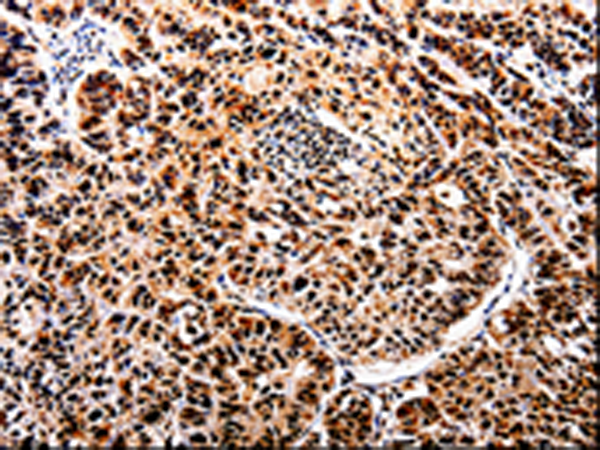

| WB | 咨询技术 | Human,Mouse,Rat |
| IF | 咨询技术 | Human,Mouse,Rat |
| IHC | 1/25-1/100 | Human,Mouse,Rat |
| ICC | 技术咨询 | Human,Mouse,Rat |
| FCM | 咨询技术 | Human,Mouse,Rat |
| Elisa | 1/500-1/5000 | Human,Mouse,Rat |
| Aliases | APIP2, CGI29, CGI-29, MMRP19, dJ179L10.2 |
| WB Predicted band size | 27 kDa |
| Host/Isotype | Rabbit IgG |
| Antibody Type | Primary antibody |
| Storage | Store at 4°C short term. Aliquot and store at -20°C long term. Avoid freeze/thaw cycles. |
| Species Reactivity | Human, Mouse |
| Immunogen | Fusion protein of human APIP |
| Formulation | Purified antibody in PBS with 0.05% sodium azide and 50% glycerol. |
+ +
以下是关于APIP抗体的3篇参考文献的简要整理:
1. **文献名称**:*APIP, a human gene associated with Myc-mediated apoptosis*
**作者**:Cho, Y.S., et al.
**摘要**:该研究首次克隆并鉴定了人类APIP基因,发现其与c-Myc介导的细胞凋亡通路相关,APIP抗体检测显示其在DNA损伤条件下调控细胞凋亡,可能通过线粒体途径发挥作用。
2. **文献名称**:*APIP regulates inflammatory responses by modulating caspase-1 activity*
**作者**:Wang, L., et al.
**摘要**:研究利用APIP抗体揭示了该蛋白在炎症小体激活中的作用,证明APIP通过抑制caspase-1活性减少IL-1β分泌,可能成为治疗炎症性疾病的潜在靶点。
3. **文献名称**:*APIP as a novel prognostic biomarker in colorectal cancer*
**作者**:Kim, H., et al.
**摘要**:通过免疫组化(APIP抗体)分析结肠癌组织,发现APIP低表达与患者不良预后显著相关,机制研究表明其通过调控嘌呤代谢通路影响肿瘤细胞增殖和转移。
APIP (Apoptotic Protease-Activating Factor-1 (Apaf-1) Interacting Protein) is a mitochondrial protein involved in regulating cell death and metabolic pathways. Initially identified as an interactor of Apaf-1. it modulates apoptosis by competing with cytochrome c for Apaf-1 binding, thereby influencing caspase activation and mitochondrial apoptotic signaling. Beyond apoptosis, APIP is implicated in methionine metabolism, functioning as a methylthioribulose-1-phosphate dehydratase in the methionine salvage pathway. This dual role links APIP to cellular homeostasis, energy balance, and redox regulation.
Dysregulation of APIP has been associated with various diseases. Reduced APIP expression correlates with increased apoptosis in neurodegenerative conditions, while its overexpression is observed in certain cancers, suggesting context-dependent roles in cell survival. APIP antibodies are essential tools for studying these mechanisms, enabling detection of protein expression, localization, and interactions via techniques like Western blotting, immunohistochemistry, and immunofluorescence. Such research aids in elucidating APIP's contribution to pathological processes, including tumor progression, metabolic disorders, and inflammatory responses. Current studies focus on its therapeutic potential, exploring APIP-targeted strategies to modulate cell death pathways or metabolic reprogramming in disease models.
×